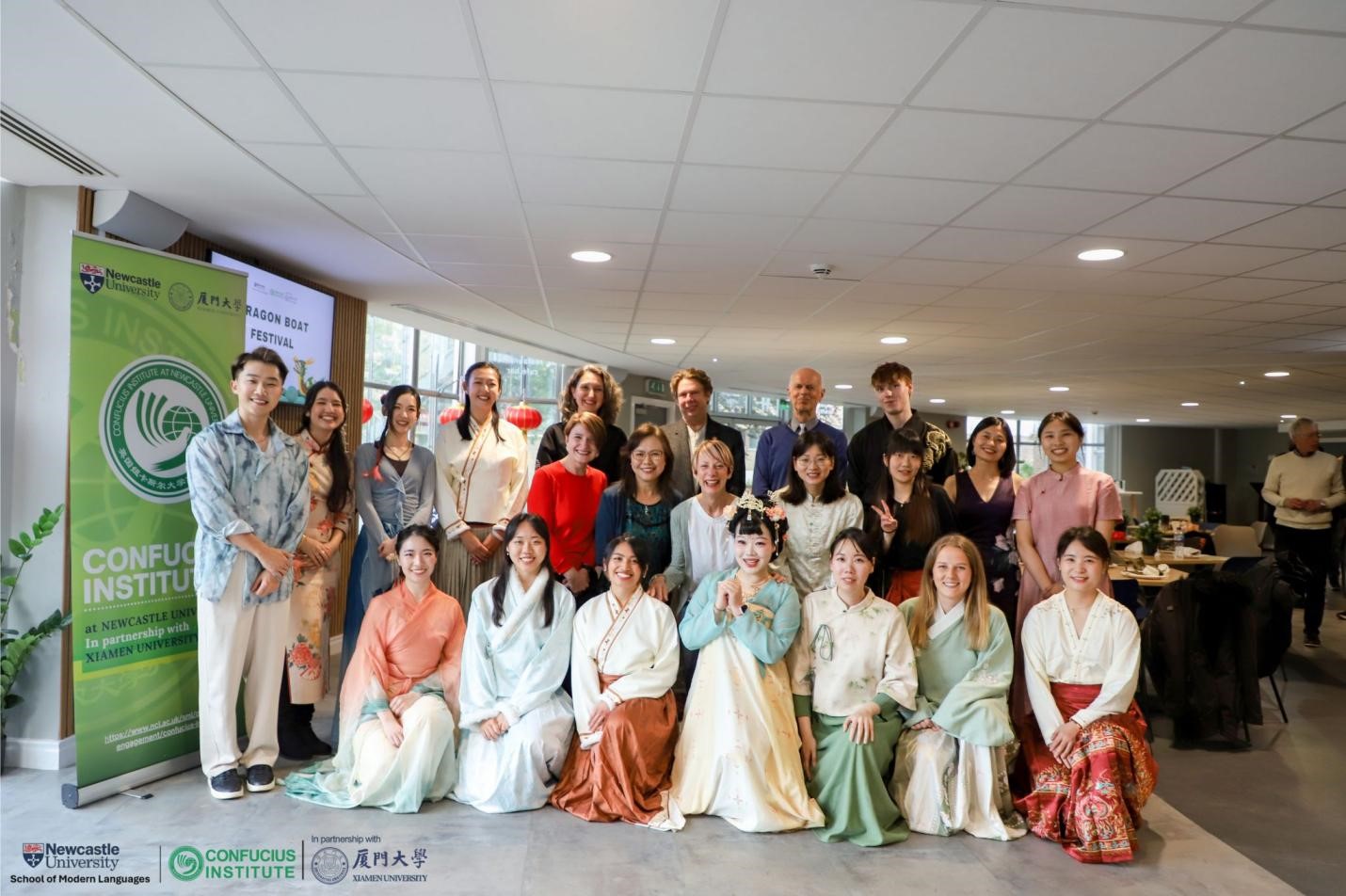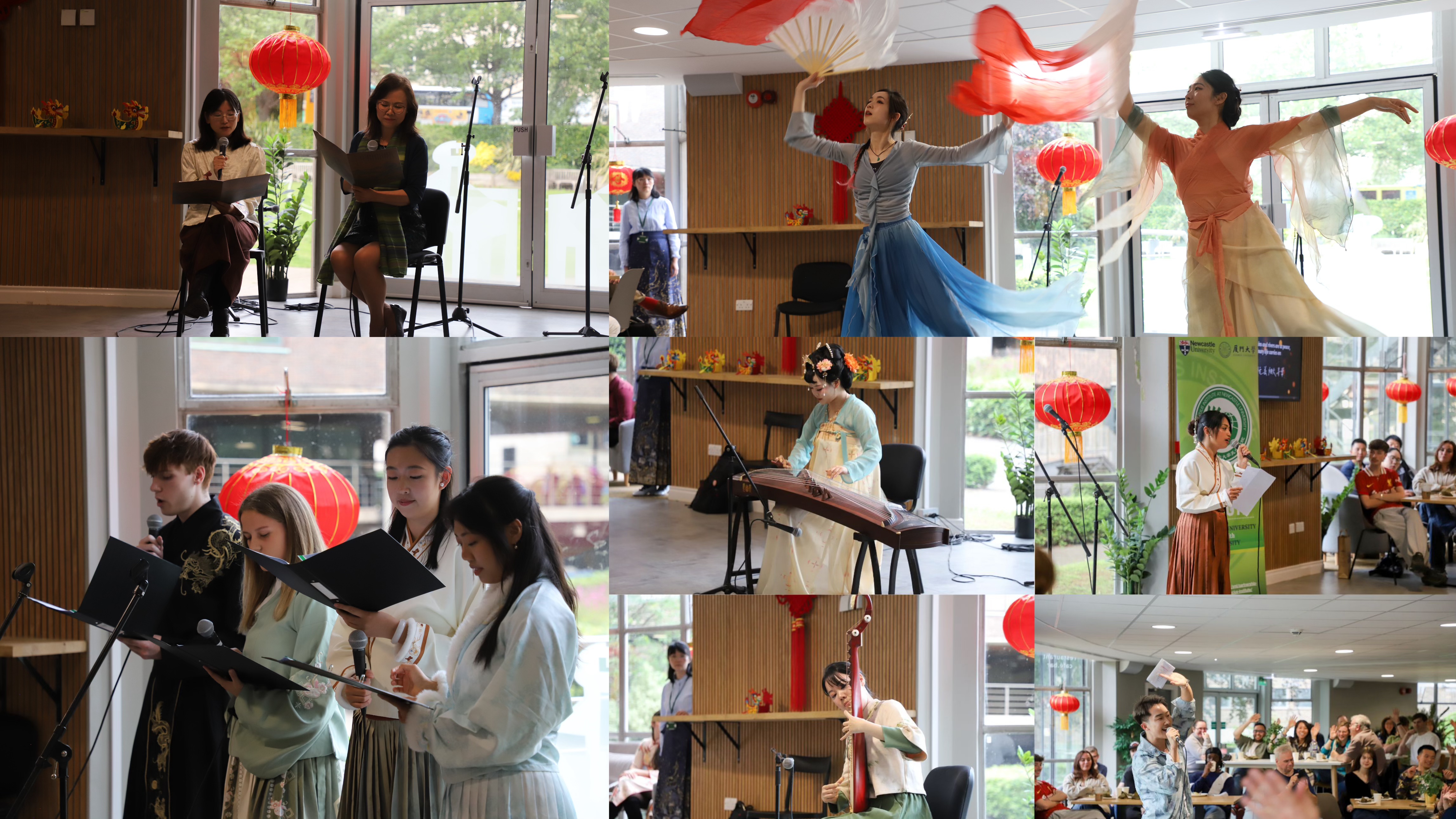University Hosts Dragon Boat Festival Celebration
10 June 2025
Newcastle University Hosts Dragon Boat Festival Celebration
On June 3rd, Newcastle University’s Confucius Institute, in collaboration with the School of Modern Languages (SML), hosted a vibrant cultural event to mark the traditional Chinese Dragon Boat Festival (Duanwu). The celebration brought together staff and students from across the University for an evening of cultural discovery, performance, and cross-cultural dialogue.
This event was planned, organized, and executed by Professor Yuxiao Su, the Chinese Director of the Confucius Institute at Newcastle University, in collaboration with Ms. Linlin Fang and Dr. Fang Su, the coordinators of the Chinese programme in the School of Modern Languages. After nearly two months of meticulous preparation, the event came to fruition. Themed around the poetic tradition, philosophical reflection, and blessings of peace and health embodied in the Dragon Boat Festival, the evening featured poetry, singing, dancing, and Chinese traditional music, and showcased joint performances by Chinese and British students. Guests were also treated to zongzi and other traditional delicacies, making the evening a grand cultural celebration that blended the aesthetic charm and appetitive hospitality in Chinese civilization.
The event attracted over a hundred attendees, including staff and students from various faculties at Newcastle University, guests of School of Modern Languages, learners from the Confucius Institute, and representatives from CI partner institutions. Special guests included Professor Jo Fox, the newly appointed Pro-Vice-Chancellor of the Faculty of Humanities and Social Sciences (HaSS); Dr. Muge Satar, Interim Dean for Global at HaSS; and Andrea Wilczynski, Head of the School of Modern Languages.
The evening fostered a rich festive atmosphere and offered a deeply engaging intercultural experience through cultural presentations, bilingual poetry recitations, music and dance performances, and tastings of traditional Chinese food. It was co-hosted by two students from the UK and China—Yuanlong (Adrian) Wang, a PhD student in the School of English Literature, Language and Linguistics and Event and Administrative Associate at the Confucius Institute, together with Tara Doherty, an undergraduate student in the School of Modern Languages studying Chinese. The pair guided the evening’s programme with a cheerful and engaging presence.
Proceedings began with welcome remarks by Dr Andrew Law, British Director of the Confucius Institute, followed by speeches from Professor Jo Fox, Dr Müge Satar, and Ms Andrea Wilczynski, each expressing strong support for initiatives that promote intercultural learning and engagement.
In her address, Professor Jo Fox highlighted the wider significance of the festival, stating:
“Tonight’s Festival comes at a particularly important moment — cross-cultural understanding and connection is critical in an increasingly unstable and uncertain world. Communicating across cultures – having a deeper appreciation of others traditions and their meanings – is a powerful mechanism for promoting tolerance, fostering bonds across borders, and mutual respect.”
Professor Yuxiao Su, Chinese Director of the Confucius Institute, and Ms Linlin Fang from the Chinese programme, jointly delivered a cultural presentation in the form of a dialogue, introducing the historical origins, traditional customs, and symbolic meanings of the Dragon Boat Festival. Their talk explored the festival’s uniquely poetic roots, centring on Qu Yuan—the noble and tragic figure at its heart—revered as both a great poet and a patriotic martyr. They discussed the profound tension and richness of Qu Yuan’s life, marked by loyalty, sacrifice, and inner conflict. Taking a cross-cultural perspective, they drew a parallel between Qu Yuan and the ancient Greek philosopher Socrates, both of whom chose to sacrifice their lives in pursuit of truth. The presentation also shed light on the cultural significance of customs such as dragon boat racing, wearing fragrant herbs, and eating zongzi (sticky rice dumplings). An interactive prize quiz further deepened the audience’s engagement and appreciation of traditional Chinese culture.
The cultural performances were a highlight of the evening. Newcastle University MA student in Applied Linguistics, Hui-Lian Lu, performed two guzheng pieces: “Ode to the Orange” and “Preface to the Orchid Pavilion”. The former is a musical interpretation of Qu Yuan’s poetic tribute to the orange tree, which symbolises noble character, steadfast integrity, and loyal patriotism—qualities reflected in its evergreen nature and its rootedness in the southern lands of Chu. The latter draws inspiration from a celebrated calligraphic masterpiece of the Eastern Jin dynasty, evoking the elegant gatherings and refined sensibilities of the classical literati..
This was followed by a bilingual recitation of “The Fisherman” from Chuci (The Songs of Chu, attributed to Qu Yuan) , presented by four students from the School of Modern Languages—James Carrielies(German and Chinese, SML), Daisy Trillo (Documentary Film and Chinese, Combined Honours), Guo Yuxuan, and Yin Yuan, both exchange students from Sichuan University, China. In a moving cross-cultural collaboration, the British and Chinese students performed in each other’s languages, powerfully conveying the philosophical dialogue between Qu Yuan and the fisherman on loyalty and retreat, idealism and reality, echoing the enduring dilemmas at the heart of Qu Yuan’s poetry. Their performance was met with enthusiastic applause from the audience. The evening continued with a diverse cultural programme.
Next, Shiqing Zhang, a PhD student in English Literature at Newcastle University, performed the pipa piece “Shan Gui” (“The Mountain Spirit”), conveying through its delicate and melancholic tones the ethereal sorrow and steadfast longing of the mountain goddess from Qu Yuan’s Nine Songs: The Mountain Spirit—a figure both noble and mournful, hovering between reality and myth as she awaits her beloved.
The performances also featured Mae Hewe from the Chinese programme in the School of Modern Languages singing the Chinese song “As One Wishes (Ruyuan)”, and Yuanlong (Adrian) Wang performing the English song “My Heart Will Go On”. Their heartfelt renditions offered a moving expression of how language learners can connect emotionally and artistically with both Chinese and Western cultures.
The finale of the evening was the duet dance “Tan Chuang” (“Peering Through the Window”), performed by Dr. Ziyi Wang, an alumna from the School of Medical Science majoring in Molecular Microbiology, and Xinyue Hu, a PhD student in English Literature, both from Newcastle University. With graceful movements inspired by the aesthetics of Kunqu opera, the two dancers told the poignant story of a performer concealing heartbreak onstage while witnessing her beloved marry another woman.
The performance artfully echoed Qu Yuan’s own tragic fate—both grappling with the pain of yearning for the unattainable, resonating deeply with the audience through its lyrical expression across time and culture.
During the event, teachers and volunteers from the Confucius Institute distributed traditional zongzi with red bean and candied date fillings to the guests, allowing them to savour the delights of Chinese cuisine alongside the evening’s philosophical and aesthetic offerings. This sharing of food also fostered relaxed conversations and a deeper sense of connection and appreciation for Chinese culture.
The event concluded on a joyful note with group photos and words of gratitude, bringing the evening to a successful close.
This Dragon Boat Festival celebration not only offered staff and students at Newcastle University a valuable opportunity to experience traditional Chinese culture up close, but also highlighted the important role of the Confucius Institute and the School of Modern Languages in promoting campus internationalisation and fostering intercultural understanding. The success of the event was made evident by the warm messages of appreciation received by the Chinese Director from several attendees the following day.
One such message came from the coordinator of a Chinese language programme at one of the Confucius Institute’s partner schools, who wrote:
“I would like to say a huge thank you for inviting me to the event last night—it was fantastic, and the performances were amazing. As soon as I arrived home, I bought a book about Qu Yuan to learn more.”
Similarly, International Newcastle—a non-profit community interest company that supports the city’s international development by fostering language learning, cultural diversity, and global citizenship through partnerships and public programmes—published a richly illustrated feature on the event on their social media platforms just two days later. The article, titled "Celebrating the Dragon Boat Festival in Newcastle" (https://internationalnewcastle.org.uk/dragonboatfestival), offered not only a vibrant account of the celebration but also an informative introduction to the history and traditions of the festival.
This event also marked the first large-scale cultural collaboration between the Confucius Institute and its host school, the School of Modern Languages. Drawing on the academic expertise and long-standing partnerships among the Chinese Director of the CI, the Chinese language coordinators at SML, and both Chinese and British students, the event seamlessly blended intellectual depth, cultural insight, artistic expression, and warm hospitality. It successfully fulfilled the meaningful goal of fostering mutual understanding, intercultural exchange, and shared values among a diverse audience.
Building on the success of this collaborative partnership, the Confucius Institute looks forward to developing more creative and resonant intercultural projects with the School of Modern Languages in the future.

